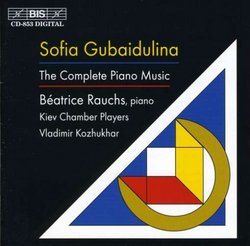| All Artists: Sofia Gubaidulina, Vladimir Kozhukhar, Kiev Chamber Players, Beatrice Rauchs Title: Sofia Gubaidulina: The Complete Piano Music Members Wishing: 2 Total Copies: 0 Label: Bis Original Release Date: 1/1/2006 Re-Release Date: 3/18/1997 Album Type: Import Genre: Classical Styles: Chamber Music, Forms & Genres, Concertos, Sonatas, Historical Periods, Classical (c.1770-1830), Modern, 20th, & 21st Century, Instruments, Keyboard Number of Discs: 1 SwapaCD Credits: 1 UPCs: 789368513628, 7318590008539 |
Search - Sofia Gubaidulina, Vladimir Kozhukhar, Kiev Chamber Players :: Sofia Gubaidulina: The Complete Piano Music
 | Sofia Gubaidulina, Vladimir Kozhukhar, Kiev Chamber Players Sofia Gubaidulina: The Complete Piano Music Genre: Classical
|
Larger Image |
CD Details |
CD ReviewsGubaidulina is one of the finest composers around, but her p Christopher Culver | 01/13/2007 (2 out of 5 stars) "Sofia Gubaidulina's piano works are few, but now exist in several different recordings. On this BIS disc, Beatrice Rauchs performs, with the Kiev Chamber Players conducted by Vladimir Kozhukhar on the concerto. The three earliest pieces were written before Gubaidulina's 1969 entrance into the Orthodox Church, which set a spiritual purpose to all the music that came after. They can therefore be fairly considered juvenalia, but are still technically inventive. The "Chaconne" (1963) is one of Gubaidulina's earliest acknowledged works, though a couple of pieces from the '50s are still in her catalogue. While inspired by the Baroque form of the chaconne--it is a sequence of variations on an eight-bar chordal theme--it doesn't possess a dance-like atmosphere nor triple time. While its involvement of dissonances breaking open the eight-bar theme, as well as the virtuosity required, make this an engaging work, one has to admit there's very little that one would recognize as Gubaidulina here. The "Piano Sonata" (1965) shows Gubaidulina dabbling in dodecaphony, as did so many of her colleagues in Soviet music during that decade. The sonata is based not on simply two themes, but on two sets of themes, both based ultimately on the same twelve-tone theme. Why the bleep-bloops stereotypical to serial piano music occasionally make an appearance, the soundworld of the sonata is surprisingly bouncy, evoking jazz. Her interest in unusual instrumental techniques, which is an important part of her mature work, also makes an appearance here. A bamboo stick is drawn along the piano pegs, while at one point glissandi are directly played on the strings. "Musical Toys" (1969) is a cycle of fourteen miniatures written for children. While they no doubt serve a useful pedagogical purpose, something universally entertaining like Kurtag's "Jatekok" they are not. In the first half of the '70s Gubaidulina wrote her last solo piano works, two very short experiments. "Toccata-Troncata" (1971), at 1'43" features hammered passages constantly broken off in an abrupt fashion. "Invention" (1974), just under a minute long, is a brief exhibition of polymeters. Finally we see a composer sure of herself. The one-movement piano concerto "Introitus" (1978) is a considerably more mature work, firmly rooted in Gubaidulina's interest in Christian mysticism. Like with many other compositions by Gubaidulina (such as "In Croce" for organ and cello, or the JOHANNES-PASSION), there is a contrast between the temporal/horizontal and the eternal/vertical. In the first portion of the work, the first theme the chamber orchestra is assigned represents Man, while the chromatic range is religious understanding. Gubaidulina goes on to develop a range of symbols too complex to describe here, but suffice it to say that this is a very good display of her spiritual aims in the art of composition. Still, I favour other orchestral endeavours from the composer, such as the violin concerto "Offertorium" and the symphony "Stimmen.. Verstummen...". As can be seen from other reviewers, Rauch's playing style is not to everyone's taste. She has a rather heavy approach and the more nimble playing of Andreas Haefliger on a 1994 Sony disc (catalogue number SK 53 960) may be more attractive for some. But to be honest, the material here is so unexciting in comparison to Gubaidulina's best mature work that it doesn't really matter for me who plays it. I decided to give this disc two stars, but this should be seen as relative to other Gubaidulina material, not an absolute scoring. Even Gubaidulina's juvenalia is better than many composers out there. And while important for the collector, these piano works would probably be a very poor introduction to Gubaidulina. For those who have never heard the music of this superlative composer, I'd recommend the JOHANNES-PASSION, her masterpiece and possibly the greatest work of Christian piety of our time, or the OFFERTORIUM disc in Deutsche Grammphon's "Echo 20/21" series." Great music, bad pianist! villegem | canada | 07/23/2003 (2 out of 5 stars) "The amazing piano music by Gubaidulina is poorly interpreted by an unimaginative pianist... Let's hope a better edition will come along and that perhaps a "lost" recording of the premiere of Introitus with Nikolaevsky conducting will surface..."
|

 Track Listings (21) - Disc #1
Track Listings (21) - Disc #1